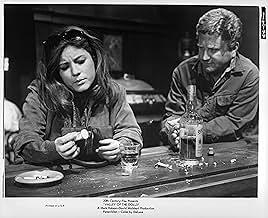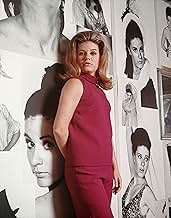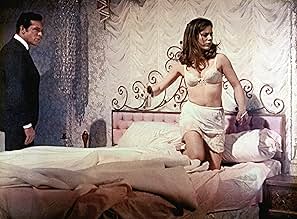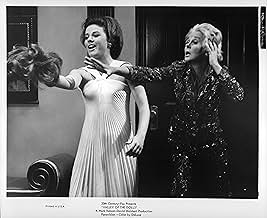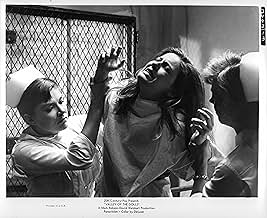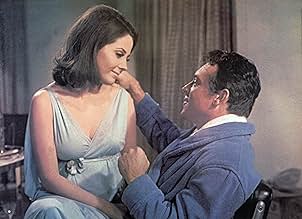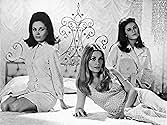CALIFICACIÓN DE IMDb
6.0/10
10 k
TU CALIFICACIÓN
Adaptación de la novela de Jacqueline Susan sobre el auge y la caída de tres jóvenes mujeres en el negocio del espectáculo.Adaptación de la novela de Jacqueline Susan sobre el auge y la caída de tres jóvenes mujeres en el negocio del espectáculo.Adaptación de la novela de Jacqueline Susan sobre el auge y la caída de tres jóvenes mujeres en el negocio del espectáculo.
- Dirección
- Guionistas
- Elenco
- Nominado a 1 premio Óscar
- 6 nominaciones en total
Alexander Davion
- Ted Casablanca
- (as Alex Davion)
Sherry Alberoni
- Neely O'Hara
- (voz)
- (sin créditos)
- Dirección
- Guionistas
- Todo el elenco y el equipo
- Producción, taquilla y más en IMDbPro
Opiniones destacadas
This movie is the greatest example of 'camp' that Hollywood ever produced. It is hysterical, stupid and lame, but you cannot take your eyes off the screen for a second. The casting is questionable (Patty Duke cannot sing, Parkins cannot do drama and I cannot badmouth Tate, but...), but the greatest legacy is Susan Hayward as Helen Lawson, the biggest bitch in the world. No one spits out a swear word or an insult like Hayward!
In spite of the harsh user comments regarding this film, it is an entertaining and thought provoking late 1960's film. The criticism of Patty Duke's performance seems to me to be at least somewhat unfair and exaggerated. In my opinion, she does an admirable job with her character and handles the role of a star who is struggling with the pressures of fame. It is really quite uncomfortable to watch this film in the present day, if one already is keenly aware of the horrible fate that is in store for Sharon Tate, at the hands of Charles Manson's drugged-out groupies. Not a great film, but much better than the users here would have you believe.
I must be crazy. Just after watching this movie, I got on IMDb to see what its rating was, and, honestly, I was expecting something a lot higher. I don't consider this movie a turning point in the film industry, but I certainly wouldn't call it bad. It's not bad. I didn't notice any flaws in the acting (which is the principle instrument for telling a movie's story)---I personally thought that Patty Duke's performance was amazing. The storyline intrigued me, and I liked the characters---especially Barbara Parkins' Anne, who I felt myself relating to by the end of the movie.
Like I said, I must be crazy. I wouldn't say this is the best movie ever made, but I thought it was rather good. I'd sit through this any day before I'd watch LORD OF THE RINGS. I guess I must have missed the horrid atrocities of this film. I'd recommend it to anyone with an interest in the darker side of show biz'.
Like I said, I must be crazy. I wouldn't say this is the best movie ever made, but I thought it was rather good. I'd sit through this any day before I'd watch LORD OF THE RINGS. I guess I must have missed the horrid atrocities of this film. I'd recommend it to anyone with an interest in the darker side of show biz'.
Viewers who like this film like it mostly because it is such a campy mess. Its main entertainment value lies in the unintended humor that results from cinematic incompetence. The main problem is the screen story.
For one thing, the character arc of Neely O'Hara (Patty Duke) is totally not credible. She's a singer who can't sing. Yet, she inexplicably goes from rags to riches on her singing ability alone. In the process, her personality morphs from sweet young thing to jaded and embittered has-been who barks and scowls at everything and everyone. Pills or no pills, her transformation does not ring true.
In addition, the film's poor plotting renders a story that is at times muddled. The plot darts and flits from one girl to the next; it spurts and sputters in a disconnected sort of way, without viable transitions. And some scenes are included evidently just to convey story exposition. A big part of the on screen time for the Jennifer character (Sharon Tate), for example, consists of three separate, and awkward, phone conversations with her mother. Other methods of explaining detail and advancing the plot would have worked better.
And the film's dialogue is campy, simply because it contains almost no subtext. It's so in-your-face, so lacking in subtlety, that some of it just reeks of junior high school theatrics.
Aside from the screen story, the overall acting is not very good. Patty Duke, in particular, is just downright awful. She shouts, she screams, she exaggerates her facial expressions in ways that are totally out of sync with the dialogue and the plot.
And the film's musical numbers are something else, especially when Susan Hayward attempts to lip sync a ghastly song called "I'll Plant My Own Tree", surrounded on stage by brightly colored fake leaves that whirl around her. The sequence is made even more ludicrous because the audience cheers wildly at the awful performance.
I guess I can't really fault the visuals, since bright colors were so trendy in the 1960s. Still, the visuals do make the film look dated. Those garish costumes and hairdos, that garish makeup, and that garish decor provide just one more reason to sneer at the film.
The only thing worthwhile here is the appearance of lovely Sharon Tate. And the film's sad theme song is professionally done. Otherwise, apart from its unintended humor, "Valley Of The Dolls" is suitable mainly as a lesson for aspiring filmmakers. In a book on film-making, this film could head the chapter: "Don't Let This Happen To You".
For one thing, the character arc of Neely O'Hara (Patty Duke) is totally not credible. She's a singer who can't sing. Yet, she inexplicably goes from rags to riches on her singing ability alone. In the process, her personality morphs from sweet young thing to jaded and embittered has-been who barks and scowls at everything and everyone. Pills or no pills, her transformation does not ring true.
In addition, the film's poor plotting renders a story that is at times muddled. The plot darts and flits from one girl to the next; it spurts and sputters in a disconnected sort of way, without viable transitions. And some scenes are included evidently just to convey story exposition. A big part of the on screen time for the Jennifer character (Sharon Tate), for example, consists of three separate, and awkward, phone conversations with her mother. Other methods of explaining detail and advancing the plot would have worked better.
And the film's dialogue is campy, simply because it contains almost no subtext. It's so in-your-face, so lacking in subtlety, that some of it just reeks of junior high school theatrics.
Aside from the screen story, the overall acting is not very good. Patty Duke, in particular, is just downright awful. She shouts, she screams, she exaggerates her facial expressions in ways that are totally out of sync with the dialogue and the plot.
And the film's musical numbers are something else, especially when Susan Hayward attempts to lip sync a ghastly song called "I'll Plant My Own Tree", surrounded on stage by brightly colored fake leaves that whirl around her. The sequence is made even more ludicrous because the audience cheers wildly at the awful performance.
I guess I can't really fault the visuals, since bright colors were so trendy in the 1960s. Still, the visuals do make the film look dated. Those garish costumes and hairdos, that garish makeup, and that garish decor provide just one more reason to sneer at the film.
The only thing worthwhile here is the appearance of lovely Sharon Tate. And the film's sad theme song is professionally done. Otherwise, apart from its unintended humor, "Valley Of The Dolls" is suitable mainly as a lesson for aspiring filmmakers. In a book on film-making, this film could head the chapter: "Don't Let This Happen To You".
One of the great landmarks in the history of American cinema. This is one of those movies that tells it like it is, takes it on the chin, and really shows some SPARKLE. Oh yeah, the wigs and gowns are fab, too, especially that sequined poison-green trapeze minidress Patty Duke is too trashed to get into towards the end.
There is a kind of sublime awfulness about the performances that elevates every sentence in the screenplay to some scriptural stratum of indelible elegance. Lines like "Gee, honey, that ole witch oughta be boiled in oil," "You're not the BREADWINNAH either," and "SPARKLE, Neely, SPARKLE" ring with poetic resonance in one's mind long after viewing the film. Especially when you find yourself compulsively watching it over and over and over again...
The montage sequences are unbelievably powerful. Forget Medium Cool, you haven't experienced the true tacky splendor of the Sixties till you've seen Barbara Parkins' Gillian Girl Commercial. Get the soundtrack and use the jingle composed by master artiste Andre Previn on your answering machine. Why, all your friends will be ringing the phone off the hook just to have a listen.
As Superstar Helen Lawson, Susan Hayward is head and shoulderpads above the rest of the cast, especially when she's attempting to lipsynch her way through "I'll plant my own tree" while dodging the giant translucent fake Calder mobile (probably built by Monsanto) that's slowly revolving around her. The symbolic-castration wig-in-the-loo sequence has to be seen to be believed. "I'll go out the way I came in" admirably sums up the sentiments of everyone connected with this movie after it was released. See Patty Duke's autobiography for some anecdotes about the filming.
This movie pretty much destroyed Director Mark Robson's career, but it made pots and pots of money for the studio, and was still playing drive in theatres around the country years after its release. And curiously enough, many women I have known now in their fifties and sixties felt drawn to this film, felt that it spoke to them (if not for them) in a way nothing else up till that time had done.
There is a kind of sublime awfulness about the performances that elevates every sentence in the screenplay to some scriptural stratum of indelible elegance. Lines like "Gee, honey, that ole witch oughta be boiled in oil," "You're not the BREADWINNAH either," and "SPARKLE, Neely, SPARKLE" ring with poetic resonance in one's mind long after viewing the film. Especially when you find yourself compulsively watching it over and over and over again...
The montage sequences are unbelievably powerful. Forget Medium Cool, you haven't experienced the true tacky splendor of the Sixties till you've seen Barbara Parkins' Gillian Girl Commercial. Get the soundtrack and use the jingle composed by master artiste Andre Previn on your answering machine. Why, all your friends will be ringing the phone off the hook just to have a listen.
As Superstar Helen Lawson, Susan Hayward is head and shoulderpads above the rest of the cast, especially when she's attempting to lipsynch her way through "I'll plant my own tree" while dodging the giant translucent fake Calder mobile (probably built by Monsanto) that's slowly revolving around her. The symbolic-castration wig-in-the-loo sequence has to be seen to be believed. "I'll go out the way I came in" admirably sums up the sentiments of everyone connected with this movie after it was released. See Patty Duke's autobiography for some anecdotes about the filming.
This movie pretty much destroyed Director Mark Robson's career, but it made pots and pots of money for the studio, and was still playing drive in theatres around the country years after its release. And curiously enough, many women I have known now in their fifties and sixties felt drawn to this film, felt that it spoke to them (if not for them) in a way nothing else up till that time had done.
¿Sabías que…?
- TriviaDirector Mark Robson had a very combative relationship with all his actresses, particularly singling out Sharon Tate for his harsh treatment. Patty Duke hated working with him, and years later, after his death, still called him "a mean son of a bitch".
- ErroresWhen Neely is tap dancing on the table, shown by her shadow on the wall, the shadow does not reflect a pony tail, but when she jumps down, she has a pony tail.
- Citas
Neely O'Hara: Boobies, boobies, boobies. Nothin' but boobies! Who needs 'em? I did great without 'em.
- ConexionesEdited into Intimate Portrait: Patty Duke (2001)
Selecciones populares
Inicia sesión para calificar y agrega a la lista de videos para obtener recomendaciones personalizadas
- How long is Valley of the Dolls?Con tecnología de Alexa
Detalles
- Fecha de lanzamiento
- País de origen
- Idiomas
- También se conoce como
- El valle de las muñecas
- Locaciones de filmación
- Redding Center, Connecticut, Estados Unidos(Welles' Home in Lawrenceville)
- Productora
- Ver más créditos de la compañía en IMDbPro
Taquilla
- Presupuesto
- USD 4,690,000 (estimado)
- Tiempo de ejecución2 horas 3 minutos
- Color
- Relación de aspecto
- 2.35 : 1
Contribuir a esta página
Sugiere una edición o agrega el contenido que falta

Principales brechas de datos
By what name was Valle de las muñecas (1967) officially released in Canada in French?
Responda




